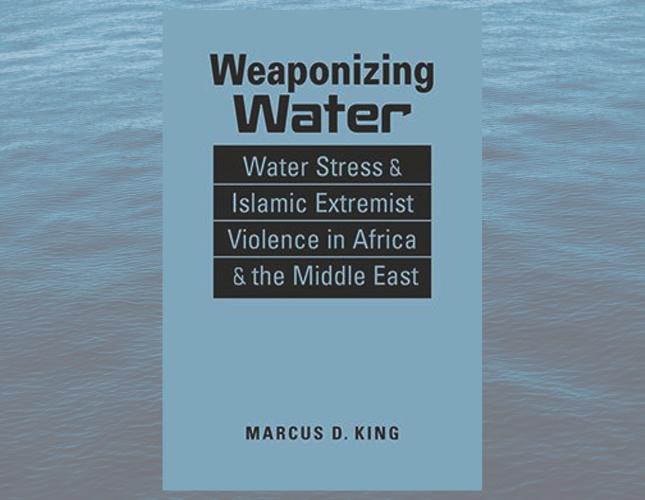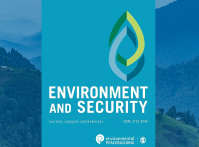-
Book Preview: “Weaponizing Water” by Marcus D. King
March 14, 2023 By Angus SoderbergBy 2050, two-thirds of the population will face some form of water stress. As a fundamental part of life, water—or a lack of it—influences other parts of life, including conflict. In fact, as author Marcus King notes in his new book, Weaponizing Water: Water Stress and Islamic Extremist Violence in Africa and the Middle East, there is a “correlation between the spheres of influence of violent extremist organizations (VEOs) and the driest lands or areas of sparse vegetation in some of the most arid regions on earth.”
That realization sparked King’s desire to write the book, in which he explores the intersection between water scarcity and extremist violence at the sub-national level in the Middle East and North Africa (MENA), as well as parts of sub-Saharan Africa. Weaponizing Water is part of King’s broader research agenda to understand water’s role in every stage of conflict, from enabling and perpetuating violence to its contribution to post-conflict situations.
King uses the example of the water-stress and conflict cycle to illustrate the pathways of influence that lead to the weaponization of water in conflict. In this cycle, water stressors such as increasing temperatures, drought, desertification, and poor water governance create systemic effects such as reduced food security and famine. The human responses to these effects include, migration, lower resilience, involvement in extremism, and even violence— all of which can contribute to conflict in societies with extremist social cleavages where water is used as a means of coercion.
Within this dynamic, King observes that “sadly, ample evidence is emerging indicating that the practice of water weaponization is spreading in similar drought-affected countries in the wider Middle East and Africa regions.” He says there are six types of water weaponization: strategic, tactical, coercive, unintentional, psychological, and extortion or incentivization. While the use of water as a weapon by states is outlawed, the book finds a worrying trend of water weaponization at the sub-national level.
Extremist conflicts in several countries, including Syria and Iraq, show that water scarcity is used as a tool of power and influence. King’s examines extremist conflicts in several countries in Weaponizing Water, including Syria and Iraq, and shows that water scarcity is used as a tool of power and influence. He concludes that the Islamic State was the main perpetrator of water-related incidents, using its strategic control over water resources to assert power over both territory and the economy—even implementing taxes on water to fund its agenda. The most well-known example of this weaponization of water is the Islamic State’s brief control of Mosul Dam, which gave them the power to flood towns along the Tigris River.
King writes that these conflicts are not just the result of ethnic or religious tensions, but rather a complex interplay of factors that fuel inequality and political instability, including water scarcity and mismanagement. He also notes that Islamic extremist groups, such as Boko Haram in Nigeria and al-Shabaab in Somalia, have exploited water stress to gain the support of local communities, recruit new members, and capitalize on their respective regions’ instability.
Weaponizing Water also points to several potential ways to mitigate the growing issue of conflict surrounding this vital resource, including the idea that revealing the heresy of water weaponization within the Islamic tradition might deter extremist groups from doing so.
King’s research also looks beyond the MENA region, indicating that “it is clearly in the global interest to stop the proliferation of water weaponization for a host of legal, ethical, and realpolitik reasons.” Not only are migrants from these regions making their way to Europe, but the countries from which they are moving are emerging strategic regional allies and trading partners for the rest of the world. Thus, King stresses that it is imperative for the international community to prevent the use of water weaponization as a norm in conflict, and calls for the need for international cooperation to stop this brutal form of warfare ahead of the UN Water Conference in March.
Weaponizing Water provides timely and essential research on an understudied topic, bridging the gap between water stress and conflict. It is an important contribution to the field of water security, not only situating water in the complex web of factors that enable violent conflict and human suffering but also identifying potential points of intervention.
Sources: American Scientist; Lynne Rienner Publishers; Scientific American
Photo credit: Cover of Weaponizing Water: Water Stress and Islamic Extremist Violence in Africa and the Middle East, courtesy of Lynne Rienner Publishers.
 A Publication of the Stimson Center.
A Publication of the Stimson Center.







